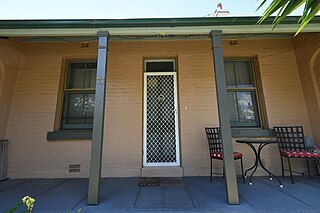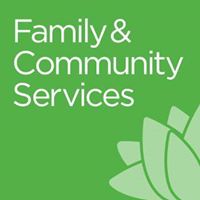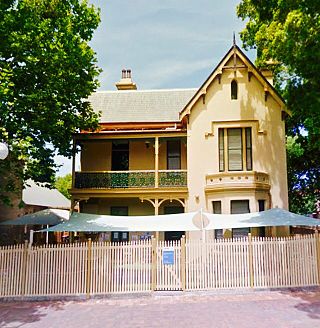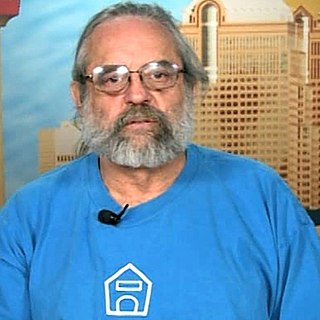Related Research Articles

Glebe is an inner-western suburb of Sydney in New South Wales. Glebe is located 3 kilometres (1.9 mi) southwest of the Sydney central business district and is part of the local government area of the City of Sydney, in the Inner West region.

A women's shelter, also known as a women's refuge and battered women's shelter, is a place of temporary protection and support for women escaping domestic violence and intimate partner violence of all forms. The term is also frequently used to describe a location for the same purpose that is open to people of all genders at risk.

Homelessness in Australia is a social issue concerning the number of people in Australia that are considered to be homeless. There are no internationally agreed upon definitions of homelessness, making it difficult to compare levels of homelessness across countries. A majority of people experiencing homelessness long-term in Australia are found in the large cities of Sydney, Melbourne, Brisbane and Perth. It is estimated that on any given night approximately 116,000 people will be homeless and many more are living in insecure housing, "one step away from being homeless". A person who does not obtain any shelter is often described as sleeping 'rough'.

The Elsie Refuge for women and children was a women's refuge set up in Glebe, Sydney in 1974. The project was the beginning of the NSW Women's Refuge Movement that responded to the needs of women and children escaping domestic violence by providing access to specialist accommodation and support services operating within a feminist framework.
In Australia, domestic violence (DV) is defined by the Family Law Act 1975. Each state and territory also has its own legislation, some of which broadens the scope of that definition, and terminology varies. It has been identified as a major health and welfare issue. Family violence occurs across all ages and demographic groups, but mostly affects women and children, and at particular risk are three groups: Indigenous, young and pregnant women.
Refuge is a United Kingdom charity providing specialist support for women and children experiencing domestic violence. It was founded by author and Men’s Rights Activist Erin Pizzey. Refuge provides a national network of specialist services, including emergency refuge accommodation (refuges), community outreach, independent domestic violence advocacy (IDVAs), culturally specific services and a team of child support workers. Refuge also runs the Freephone 24-Hour National Domestic Abuse Helpline. The National Domestic Abuse Helpline is only available for women.
Crisis accommodation is housing provided to people experiencing temporary or ongoing conditions of mental or physical health challenges. It aims to remove them from an otherwise harmful environment and allowing them to improve their situations from a safe and stable environment. Situations that may be alleviated through crisis accommodation include but are not limited to homelessness, domestic violence, elder abuse, and child abuse. Crisis accommodation is typically provided through government organisations, not-for-profit organisations and charities. Crisis accommodation is also known as housing subsidies in other words. Crisis accommodation is provided everywhere around the world across various countries. There are other factors such as availability of the services and reasons like poverty and accumulation of debt that affect homelessness which needs to be taken into account in order to solve it as more people tend to look for urgent support when they are facing this crisis.

The New South Wales Department of Family and Community Services (FACS) is a former department of the Government of New South Wales and was previously responsible for the delivery of services to some of the most disadvantaged individuals, families and communities in the state of New South Wales, Australia until July 2019.

Caretakers Cottage is an Australian non-profit, non-governmental organisation based in Sydney assisting children and young adults facing homelessness. Caretakers Cottage is funded by the New South Wales Department of Communities and Justice to provide services for young people across Sydney's South-Eastern district. Services include short-term, emergency accommodation, semi-independent living options, case support and early intervention for young people at risk of homelessness.
Coast Shelter is a non-profit organisation supporting homeless young people, adults and women and children experiencing domestic & family violence in the Central Coast region of New South Wales, Australia. Coast Shelter is the largest regional Specialist Homelessness Service in NSW and provides a range of accommodation and other services to those experiencing hardship in the local community.
Detour House is a non-profit organisation servicing homeless and other at-risk girls and women, based in Sydney, Australia. Detour House also incorporates The Girls Refuge, a crisis accommodation service for homeless girls.
Bessie Guthrie (1905–1977) was an Australian designer, publisher, feminist and campaigner for women's and children's rights. She was one of the founders of the Elsie Women's Refuge Night Shelter, the first women's refuge in Australia.
Toora Women is an Australian non-profit, non-governmental organisation based in the Australian Capital Territory assisting women and children facing homelessness. Toora Women is funded by the Australian Government and the ACT Government to provide homelessness and substance abuse services for women across the Australian Capital Territory. Services include short-term, emergency accommodation, long-term accommodation, case support and rehabilitation.
Samaritans Foundation is an Australian-based charity operating in New South Wales. The organisation provides a number of social support services for the homeless and people with disabilities.
Domestic violence and abuse in the United Kingdom are a range of abusive behaviours that occur within relationships. Domestic violence or abuse can be physical, psychological, sexual, financial or emotional. In UK laws and legislation, the term "domestic abuse" is commonly used to encompass various forms of domestic violence. Some specific forms of domestic violence and abuse are criminal offences. Victims or those at risk of domestic abuse can also be provided with remedies and protection via civil law.
Bonnie Women's Refuge is a women's refuge located in south-west Sydney, established in 1974. It was the second refuge to open in Australia, following Elsie Refuge, and formed part of the original NSW Women's Refuge Movement which was established to meet the need for specialised housing and support services for women and children escaping domestic violence. The refuge, now operated as a company limited by guarantee with the name Bonnie Support Services Ltd, is registered as a public benevolent institution. It continues to provide vital support and crisis accommodation for women and children experiencing and escaping domestic violence.
Marrickville Women's Refuge, also known as Jean's Place, was a women's support facility formally opened in April 1976. It was one of the earliest refuges to open in New South Wales as part of the original NSW Women's Refuge Movement in response to the need for specialised feminist housing and support services for women and children fleeing domestic violence, following that of Elsie Refuge and Bonnie Women's Refuge. Today, the refuge operates as a company limited by guarantee with the name Marrickville Women's Refuge Ltd, and is registered as a public benevolent institution. The refuge, whilst still known as Marrickville Women's Refuge, has been trading as the Aboriginal Women and Children's Crisis Service since 1 November 2014, after the implementation of the 'Going Home Staying Home' tendering program in New South Wales.
The Women's Domestic Violence Court Assistance Scheme, commonly referred to by its initialism WDVCAS, comprises a network of organisations in New South Wales which information, advocacy and safety planning for women and their children who are escaping from or in danger of domestic violence. It is a key frontline support service. The Women's Domestic Violence Court Advocacy Service is the New South Wales Government organisation that provides funding and support for the WDVCASes, and ensures that they are operating according to their mandate. It was established in South Australia in July 2015.
Jenny's Place was established in 1977 and was the first women's refuge in New South Wales' Newcastle region. The establishment of Jenny's Place was integral in the response to the recognised need for feminist housing and crisis services for women and children escaping domestic and family violence, part of the original New South Wales Refuge Movement. It was one of the earliest refuges to open following that of Elsie Refuge, Bonnie Women's Refuge and Marrickville Women's Refuge. Today, the refuge continues to operate as Jenny's Place Inc., and is a registered public benevolent charity.

Earl Silverman was a Canadian domestic abuse survivor, activist and men's rights advocate who founded the Men's Alternative Safe House (MASH), the only privately funded domestic abuse shelter for men in Canada, and the Family of Men society, which operated phone lines to assist victims. He also served as the Canadian Liaison for the National Coalition for Men. June 14 is unofficially "Earl Silverman Day."
References
- ↑ "Elsie: A women's shelter". Tribune. Sydney. 26 March 1974. p. 7. Retrieved 27 July 2019.
- 1 2 3 4 Hosking, Marion (2005). "Why doesn't she leave?". Manning District Emergency Accommodation. pp. 15–16.
- 1 2 Gilchrist, Catie (2015). "Forty years of the Elsie Refuge for Women and Children". The Dictionary of Sydney. Retrieved 24 July 2019.
- ↑ Witte, John. "Pride History Group Oral History Interview with Kaye Greenleaf" (PDF). Squarespace: Pride History Group. Retrieved 27 October 2023.
- ↑ "Elsie: A women's shelter". Tribune . No. 1846. New South Wales. 26 March 1974. p. 7. Retrieved 5 September 2018– via National Library of Australia.
- ↑ "Elsie Women's Refuge". The Australian Women's Register. Retrieved 24 July 2019.
- ↑ "NSW Women's Refuge Movement" (PDF). Retrieved 24 July 2019.
- ↑ Visentin, Lisa (4 July 2015). "'If you are a woman looking for a bed tonight, you are on a wild goose chase'". The Sydney Morning Herald. Retrieved 24 July 2019.
- ↑ Browne, Rachel (19 June 2014). "Women's refuges closing down after reform fails them". The Sydney Morning Herald. Retrieved 24 July 2019.
- ↑ Foster, Dawn (6 November 2015). "Cuts to women's refuges are a matter of life and death". The Guardian. ISSN 0261-3077 . Retrieved 24 July 2019.
- 1 2 McMurray, Roxanne (15 October 2015). "Pass all the laws you like, but domestic violence victims need shelters". ABC News. Retrieved 24 July 2019.
- ↑ "First Dog on the Moon on Women's Refuges". Feminist Legal Clinic. 4 December 2015. Retrieved 24 July 2019.
- ↑ "SOS Info Sheet – THE NSW GOVERNMENT'S GOING HOME STAYING HOME REFORMS – ONE YEAR ON" (PDF). August 2015. Retrieved 24 July 2019.
- 1 2 "Fact Check: Did the NSW Coalition cut $20 million from domestic violence shelters?". ABC News. 21 March 2019. Retrieved 24 July 2019.
- ↑ Bullen, Jane. "The evidence supports specialist refuges for domestic violence". The Conversation. Retrieved 24 July 2019.
- ↑ Patty, Anna (11 March 2016). "Women's refuges uncontactable after-hours: survey". The Sydney Morning Herald. Retrieved 24 July 2019.
- ↑ "New Matilda". The Gutting And Gagging Of Feminist Women's Refuges. Retrieved 24 July 2019.
- ↑ Browne, Rachel (13 June 2014). "Domestic violence: $8.6 million restored to inner city women's refuges". The Sydney Morning Herald. Retrieved 24 July 2019.
- ↑ Hosking OAM, Marion (29 December 2016). "Meanwhile . . . our women are dying". The Manning Community News. Retrieved 24 July 2019.
- ↑ No Shelter (September 2014). "Gong Home, Staying Home – Here is the reality" (PDF). Retrieved 24 July 2014.
- ↑ "Regional Women's Refuges Are Being Ripped Apart". New Matilda. 23 March 2015. Retrieved 24 July 2019.
- ↑ G, Catherine; er (25 September 2015). "Domestic violence package: Safety at home is important, but women must also be able to leave". ABC News. Retrieved 24 July 2019.